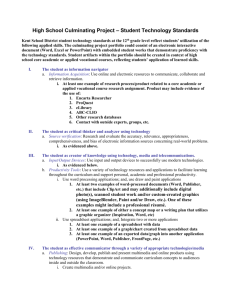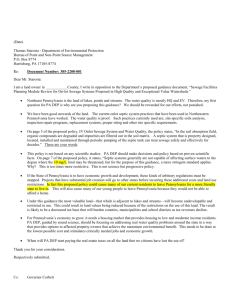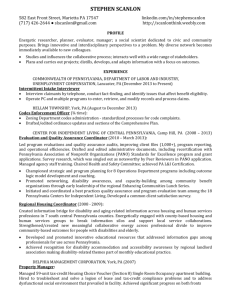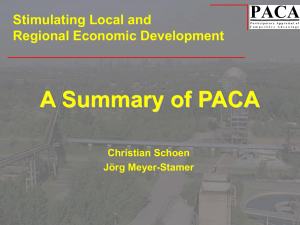HelpingFamiliesInMHCrisis2014
advertisement
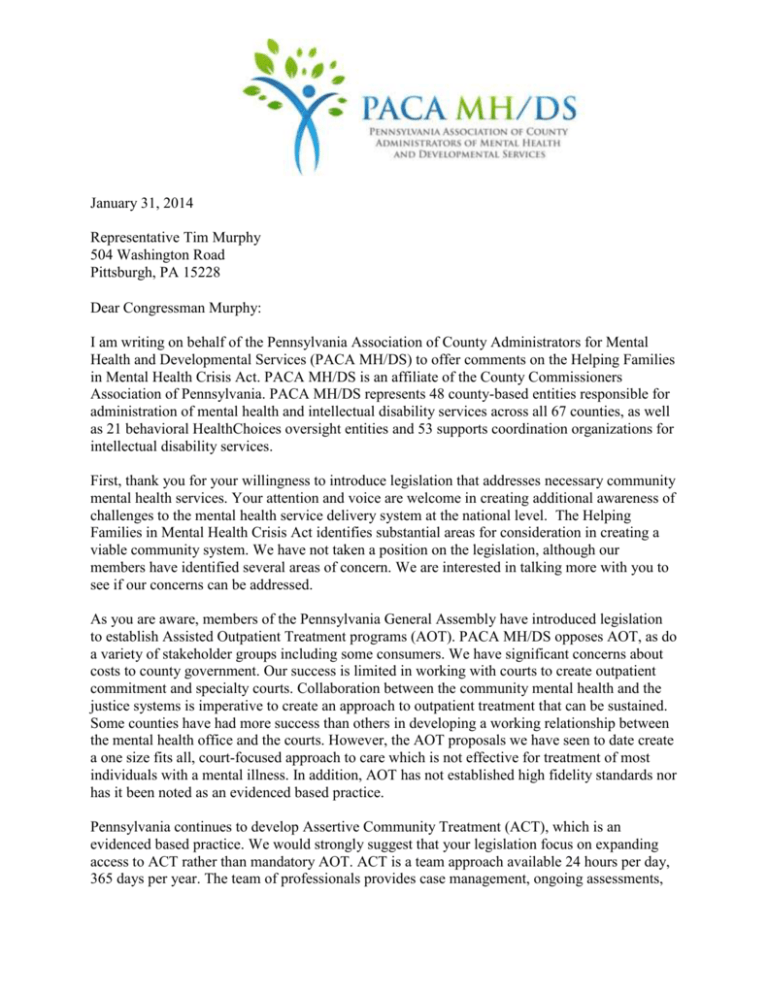
January 31, 2014 Representative Tim Murphy 504 Washington Road Pittsburgh, PA 15228 Dear Congressman Murphy: I am writing on behalf of the Pennsylvania Association of County Administrators for Mental Health and Developmental Services (PACA MH/DS) to offer comments on the Helping Families in Mental Health Crisis Act. PACA MH/DS is an affiliate of the County Commissioners Association of Pennsylvania. PACA MH/DS represents 48 county-based entities responsible for administration of mental health and intellectual disability services across all 67 counties, as well as 21 behavioral HealthChoices oversight entities and 53 supports coordination organizations for intellectual disability services. First, thank you for your willingness to introduce legislation that addresses necessary community mental health services. Your attention and voice are welcome in creating additional awareness of challenges to the mental health service delivery system at the national level. The Helping Families in Mental Health Crisis Act identifies substantial areas for consideration in creating a viable community system. We have not taken a position on the legislation, although our members have identified several areas of concern. We are interested in talking more with you to see if our concerns can be addressed. As you are aware, members of the Pennsylvania General Assembly have introduced legislation to establish Assisted Outpatient Treatment programs (AOT). PACA MH/DS opposes AOT, as do a variety of stakeholder groups including some consumers. We have significant concerns about costs to county government. Our success is limited in working with courts to create outpatient commitment and specialty courts. Collaboration between the community mental health and the justice systems is imperative to create an approach to outpatient treatment that can be sustained. Some counties have had more success than others in developing a working relationship between the mental health office and the courts. However, the AOT proposals we have seen to date create a one size fits all, court-focused approach to care which is not effective for treatment of most individuals with a mental illness. In addition, AOT has not established high fidelity standards nor has it been noted as an evidenced based practice. Pennsylvania continues to develop Assertive Community Treatment (ACT), which is an evidenced based practice. We would strongly suggest that your legislation focus on expanding access to ACT rather than mandatory AOT. ACT is a team approach available 24 hours per day, 365 days per year. The team of professionals provides case management, ongoing assessments, psychiatric services, employment and housing assistance, family support and education, substance abuse services and other services and supports critical to successfully living in the community. Extensive research and evaluation of ACT over the course of thirty years proves clinical and cost effectiveness as recognized by the Substance Abuse and Mental Health Services Administration, the Robert Wood Johnson Foundation and the Commission on Accreditation of Rehabilitation Facilities. Pennsylvania struggles to implement some evidenced based practices statewide due to the vast rural and demographic differences that exist in the state. Evidenced based practices that require fidelity to the model do not consider the challenges of access due to limits in transportation or travel time, sufficient numbers of individuals to serve in a geographic area to make the service economically feasible to sustain a quality provider and the ability to recruit appropriately trained professionals in all communities. Consideration needs to be given to various options that can meet needs at the local level that are not evidenced based, but create positive outcomes for individuals and their communities. Increasing local awareness and capacity is critical to supporting community members. To that end, we support the training of public safety officers, police, and emergency workers regarding mental illness and other disabilities. Training individuals employed in and working with the public regarding mental illness can be an effective approach to de-escalating a situation and giving appropriate referrals to services. The evidence based practice of Mental Health First Aid confirms this. While there are many positive results from evidence-based practices, the restriction of federal funding solely to evidence based practices creates concern. A person-centered approach, which the proposal requires, is intended to be a jointly developed, non-threatening way to plan life and supports, which may or may not include evidenced based practices. In fact, the person-centered approach is intended to rely on natural supports, which frequently are insufficient to promote mental health. Non-evidence based practices and evidenced based practices are both to be considered in a person-centered approach, but would not be possible under the current proposal with the evidence based only restriction. Fortunately, Pennsylvania does have a myriad of practices upon which to build. Mental Health Advance Directives are effective despite not being evidenced based. They complement the evidence based practice of a Wellness Recovery Action Plan (WRAP). In addition, Mental Health Advance Directives empower an individual to share information with identified care givers and treatment providers. Advance directives reduce adversarial court proceedings while fulfilling the proposal’s intent to have care givers engaged in the treatment process. We encourage further discussion on how to align services and approaches that are effective and appreciate your recognition of gaps. Pennsylvania is a rural state and could benefit from increased professional capacity, tele-psychiatry, and reforms for individuals who are dually eligible for Medicare and Medicaid. Technology does need to develop to support services across systems. In addition, our experience has been that paid advocacy is an independent third party that identifies individual and systemic gaps. Your proposal would eliminate our current advocacy structure, which assists in keeping an eye on the viability of the service system as a whole and for individuals to access necessary services. Pennsylvania’s experience with engaging all stakeholders from administration, treatment professionals, care givers and recipients has created a more responsive and transparent system. Finally, PACA MH/DS is concerned about the fiscal viability of the extensive changes proposed in a cost neutral manner. Unfortunately, judicial approaches may not realize cost savings for mental health services, but do decrease costs in other systems over time. Numerous components identified such as professional capacity, evidence based services, court orders, technology, mandated training and outreach include historical and new cost drivers in a time where initiatives are intended to be cost neutral. In addition, Pennsylvania’s recent Human Services Block Grant includes federal mental health funding and would need to be reviewed in light of any changes. Your clear interest to create a sustainable mental health system to address individual and public interest is commendable. PACA MH/DS would like to be part of effective systems change to create healthy and safe communities. If you are willing to consider some changes to your proposal, we would welcome the opportunity to talk further with your staff about modifications to address our concerns. You can contact me directly at 717-232-7554 x 3113 or email krotz@pacounties.org. Sincerely, Kristen Rotz Executive Director


